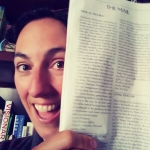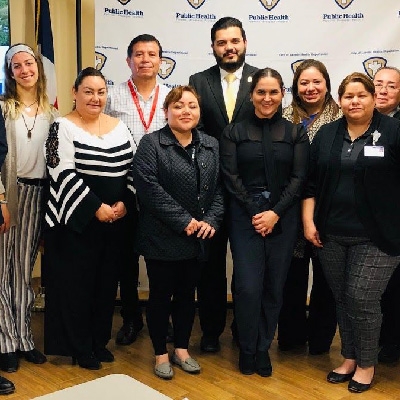How A Workplace Injury Inspired A Worker: Workers' Rights and Train-the-Trainer in Laredo, TX
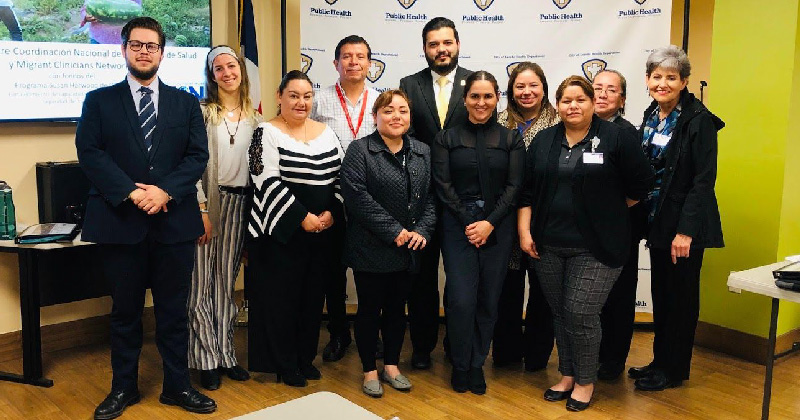
MCN's Kate Kruse and Alma Galvan with the participants of the Train-the-Trainers workshop in Laredo, TX.
In all areas of work, people face the risk of injury on a daily basis. From acute injuries that happen in an instant to health conditions that develop over months or years of strain or exposure, all workers run the risk of incidents on the job. Facing complications like language and cultural differences and immigration status, immigrant workers often receive inadequate training about workplace safety and their rights as workers in the United States, thus increasing their vulnerability to workplace injury and complicating their ability to receive care in the case of incidents on the job.
In the case of Norma, a Mexico native working at a school in Laredo, TX, the lack of information about workers’ rights and the workers’ compensation system cost her years of chronic pain and countless medical bills that could have been avoided. In 2017, Norma fell on her elbow while working with children, sending shooting pain up through her arm and into her shoulders. She was rushed to the hospital, who initially treated the acute injuries she sustained in the bones and surrounding muscles of her left arm. Per her clinician’s recommendation, she rested at home for a few months, and her workers’ compensation insurance paid a portion of her wage while she recovered.
After four months of recovery, Norma felt pressured to return to work in order to keep her job, despite her ongoing pain. She worked with chronic pain throughout her elbow and shoulder for two more years, at which point she returned to the doctor in search of a solution to her discomfort. Upon returning to the doctor, Norma was told that her injury had become inflamed to such a severe degree that she would need surgery. To her dismay, she was then informed that her workers’ compensation only covered her expenses within the first two years following the initial injury, leaving her to pay for the surgery out of pocket. Because her employers did not adequately explain her rights under the workers’ compensation system, Norma was left with incredibly costly medical bills from an injury she sustained on the job. Had she been aware of the two-year limit to her coverage, Norma could have returned for follow-up care sooner and avoided paying for her surgery without health insurance.
To help educate her peers about their rights as workers in the United States, Norma now participates in a worker health and safety project that provides safety information and training for other Latinx workers in Laredo, TX. By spreading this knowledge to people in her community, Norma is helping to ensure that more workers are aware of their rights, which can help prevent others from getting into the same situation.
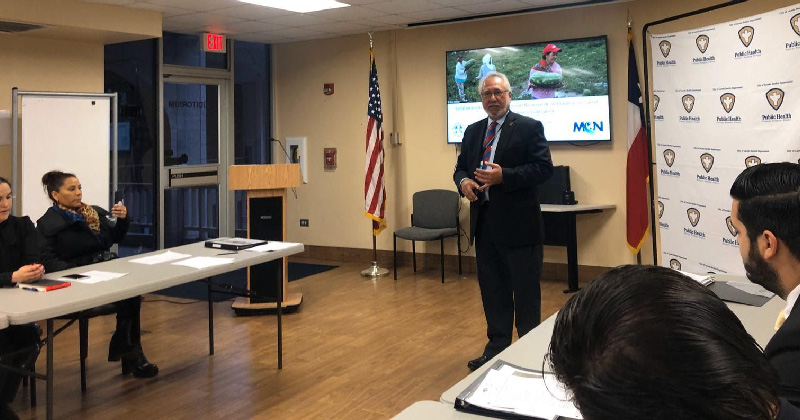
Dr. Hector Gonzalez, Director of the Laredo Health Department
Situated on the US-Mexico border, the city of Laredo, Texas truly is a binational region, full of rich Mexican-American culture and bilingual residents. While just about anyone you encounter in the border town speaks some level of Spanish, most workplaces in the area still struggle to provide adequate health and safety training in Spanish, leaving workers vulnerable to chemical overexposure, heat-related illness, and musculoskeletal injury. Additionally, many migrant workers in Laredo are hired on contract, which does not require employers to provide workers’ compensation insurance, furthering their vulnerability and risk of untreated workplace injury or illness. The Ventanilla de Salud, a program of the Mexican government within the Mexican Consulates in the United States, is the ideal partner to address the unique health needs of the migrant population in and around the area of Laredo. Partners working in the Ventanilla de Salud in Laredo offer a wide variety of services to vulnerable workers, including legal assistance, health screening and vaccination, sexual health testing and information, and outreach work via promotores de salud or community health workers.
As part of MCN’s second year of their OSHA (Occupational Safety and Health Administration)-funded project, “Filling the Gap in Worker Training: Capacity Building in Occupational Safety and Health,” project coordinator Kate Kruse and program manager Alma Galvan met with partners in the Ventanilla de Salud in Laredo for a seven-hour Train the Trainers (ToT) workshop in which participants discussed the dangers of chemical exposure, musculoskeletal injuries, and heat stress, as well as the rights and responsibilities of workers under the OSH Act. Hosted in the City of Laredo Health Department with a special introduction from Director Dr. Hector Gonzalez, the training used real-life examples to bring these issues to light and concluded with a program planning session led by Priscila Arias, the coordinator of the Ventanilla de Salud in Laredo,TX. The training, which was held before the onset of COVID-19-related distancing protocols, was held in person last month. Future in-person trainings and meetings have unfortunately been postponed until further notice.
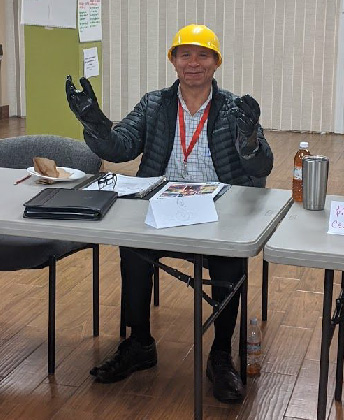
A training attendee wears personal protective equipment as part of a demonstration.
“I believe it is of utmost importance for the Ventanilla de Salud program and its partners to know the dangers that workers face on the job, recognize ways to protect workers from workplace injuries, and learn about the rights and responsibilities that all workers have, regardless of their legal migration status. It is a pleasure to learn such crucial information and to be able to share it with the community in Laredo, Texas,” expressed Priscila Arias, the coordinator of the Ventanilla de Salud in Laredo, after participating in the ToT workshop on occupational safety and health.
Helping workers protect themselves on the job is one of the core objectives of Migrant Clinicians Network. To reach this aim and further our occupational safety and health capacity as well as that of our partners, MCN is collaborating with Ventanillas de Salud. This year we are working in three locations: Laredo, TX, San Bernardino, CA, and Yuma, AZ. This project utilizes a train-the-trainer model in which MCN leads workshops with community health workers, who then hold workshops for workers within their communities. After staff at each location has been trained on health and safety topics, they will share what they learned with at least 200 workers who are employed as farmworkers, restaurant employees, factory workers, construction workers, and cleaning personnel. The COVID-19 pandemic unfortunately postponed our in-person training opportunities for now, but we look forward to continuing the work through online webinars until the situation has been resolved. With the help of enthusiastic and dedicated partners at the Ventanillas de Salud, MCN is empowering workers to protect themselves on the job.
Here are a few resources that can help:
Water, Rest, Shade: 9-minute video that presents some of the most important issues about prevention and adequate response to heat illness.
Safety in Words: MCN's Bilingual Graphic Dictionary which illustrates risks in the workplace and the best health and safety practices in agriculture.
The Playing Field: This 18-minute video tells a story of a girl who experienced exposure to pesticides while she played in the field, where her father works.
Chasing the Sun: This 30-minute video serves as a lesson on pesticide safety in the field.
¡Cuídate! A Simple Guide For Preventing Muscle Injuries At Work: An educational resource on the prevention of musculoskeletal injuries at work. This comic is in Spanish, English, and Haitian Creole.
A Little Bit of Poison...Will it Kill You?: A manual for lay health educators or community health workers that helps with community education activities about pesticides.
Working with Farm Animals: Comic about how to prevent zoonotic diseases when working with farm animals.
Resources in Spanish
Lo que bien empieza…bien acaba: Comic book that aims to reduce the risk of pesticide exposures in women of reproductive age. Only in Spanish.
Poco veneno… No mata?: Comic book on pesticides and chemicals used at home. Only in Spanish.
Like what you see? Amplify our collective voice with a contribution.
Got some good news to share? Contact us on our social media pages above.
Return to the main blog page or sign up for blog updates here.
- Log in to post comments
